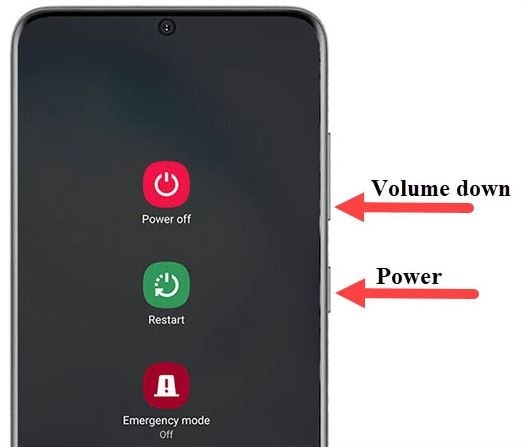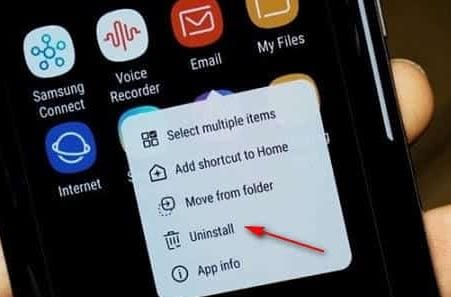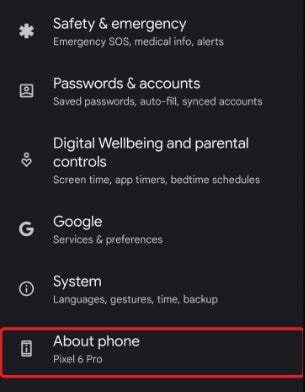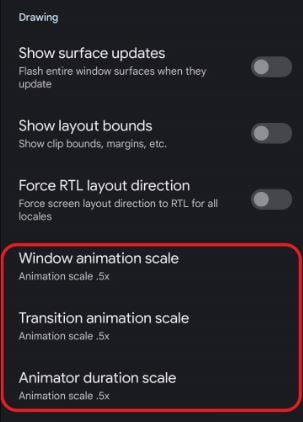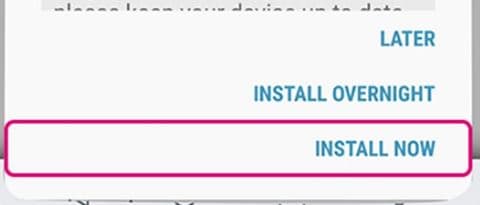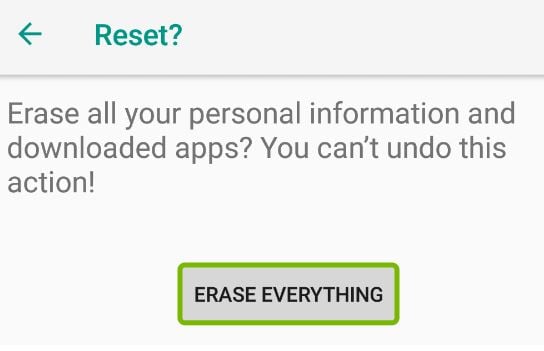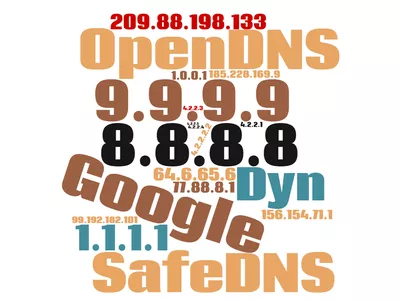
How to Flash Dead Xiaomi Redmi Note 13 Pro 5G Safely | Dr.fone

How to Flash Dead Xiaomi Redmi Note 13 Pro 5G Safely
- Fix malfunctioning Android to normal in one click.
- Highest success rate to fix all Android issues.
- Step-by-step guidance through the fixing process.
- No skills required to operate this program.
A phone is considered to be dead when it becomes completely unresponsive and refuses to switch on. Similarly, an Android phone is said to be dead when it does not boot up. You may try to switch it on several times by pressing the power button but in vain. You will see no sign of the phone’s logo or anything like a welcome screen. The Android phone’s screen remains black and does not illuminate when you try to turn it on. Interestingly, even when you charge this dead device, it does not show that it is getting charged.
Many people regard this as a battery issue, and many think of it as a temporary software crash. Some users also seem to believe that this is because of a virus attack. However, if you are looking for ways that tell how to fix a dead Android phone, you must understand that a dead phone or device can be cured by flashing custom firmware safely. If you are keen to know how to flash a dead Android phone or how to flash dead Android phones using PC, here are ways to help you.
Given below are eight techniques to flash your Xiaomi Redmi Note 13 Pro 5G safely, depending upon which phone you are using. It may seem time-consuming and tedious, but we can assure you that it works. So, move ahead and read on to learn about flashing new firmware, your Xiaomi Redmi Note 13 Pro 5G, MTK Android, and Xiaomi Redmi Note 13 Pro 5G safely.

Part 1: Can a Dead Phone Be Flashed?
Flashing a dead Android phone might be skeptical for many users who have been in such a situation. Although it is possible to flash a dead Android phone, it is essential to be aware of the reasons that lead you into such a situation. Before a remedy, diagnosing the problem is a necessity for retaining the Xiaomi Redmi Note 13 Pro 5G device.
From battery issues to physical damage to the Xiaomi Redmi Note 13 Pro 5G device, there can be many reasons your Xiaomi Redmi Note 13 Pro 5G died. The reasons for a dead Android phone are not restricted to these points. There can be software-related issues or firmware issues that might cause such havoc on your Android.
Part 2: How to flash Xiaomi Redmi Note 13 Pro 5G in one click
While you are worried about how to flash Xiaomi Redmi Note 13 Pro 5G instantly with a single click, Dr.Fone - System Repair (Android) swiftly makes its way with a galore of options for you. This amazing tool from Wondershare can fix a plethora of Android system issues such as crashing of apps, black screen of death, failed system update, etc. Moreover, it can also get your device out of boot loop, unresponsive bricked Android mobiles as well as stuck at the Xiaomi Redmi Note 13 Pro 5G logo.
Dr.Fone - System Repair (Android)
One-click solution to flash Xiaomi Redmi Note 13 Pro 5G
- The high success rate in fixing Xiaomi Redmi Note 13 Pro 5G Android devices.
- All the latest Xiaomi Redmi Note 13 Pro 5G devices are supported by this software.
- One-click operation of this tool helps you how to flash Xiaomi Redmi Note 13 Pro 5G easily.
- Being very intuitive, it doesn’t need you to be tech-savvy to use this software.
- It is one of its kind and the first one-click Android repair software on the market.
3981454 people have downloaded it
Step-by-step Tutorial
We are going to explain how to flash a dead Android phone using a PC using Dr.Fone - System Repair (Android)
Note: Before you understand how to flash Dead Android phone, take a backup of your data and then proceed to avoid any data loss.
Phase 1: Prepare your Xiaomi Redmi Note 13 Pro 5G
Step 1: Once you have downloaded and installed Dr.Fone, launch it. From the main menu, tap on ‘System Repair’ and get your Xiaomi Redmi Note 13 Pro 5G connected to it.

Step 2: Click ‘Android Repair’ from the available options, and then press the ‘Start’ button to fix the Dead Android phone by flashing it.
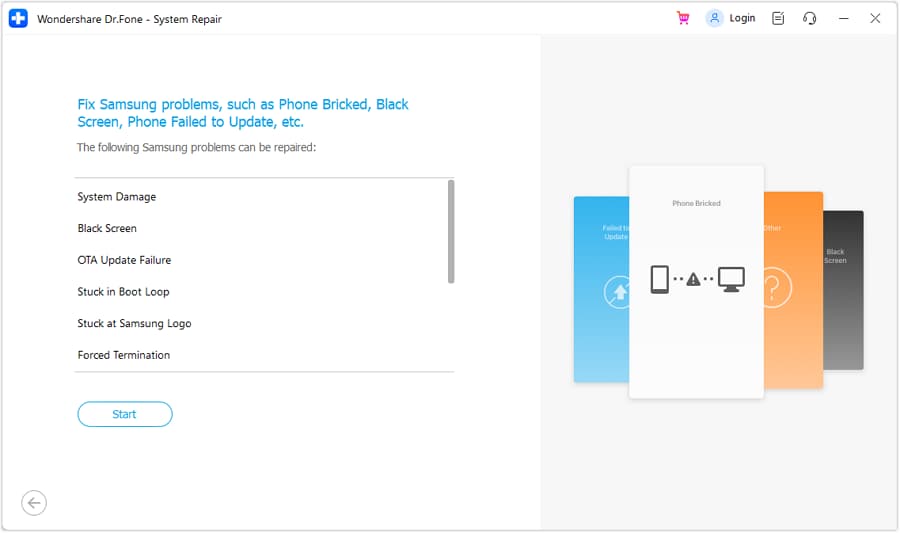
Step 3: On the Xiaomi Redmi Note 13 Pro 5G device information screen, pick the appropriate device brand, name, model, and other details followed by tapping the ‘Next’ button.
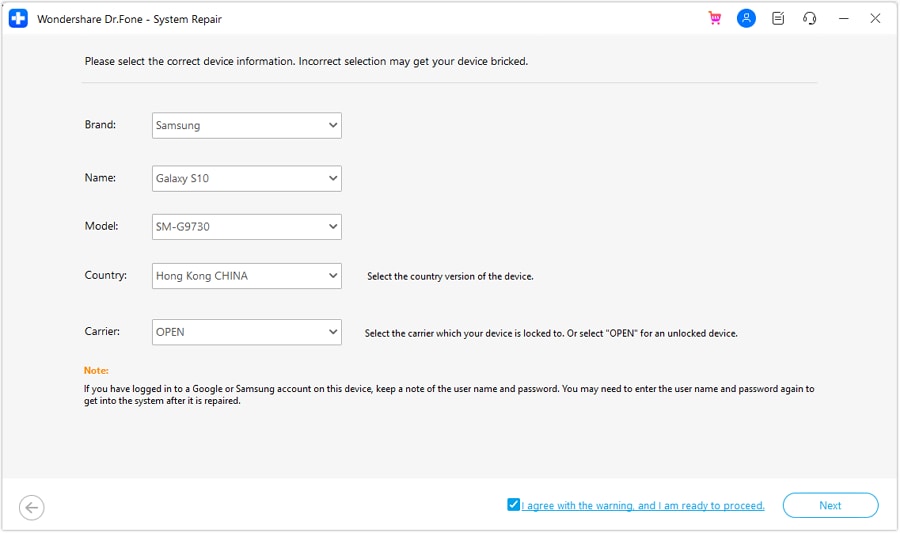
Phase 2: Put the Android device in Download mode to start repair.
Step 1: It is essential to boot your Xiaomi Redmi Note 13 Pro 5G in Download mode before repairing.
- If the Xiaomi Redmi Note 13 Pro 5G device has a ‘Home’ button: Turn it off and then hold down the ‘Volume Down’, ‘Home’, and ‘Power’ buttons altogether for 5-10 seconds. Un-hold all of them and hit the ‘Volume Up’ button for entering ‘Download’ mode.
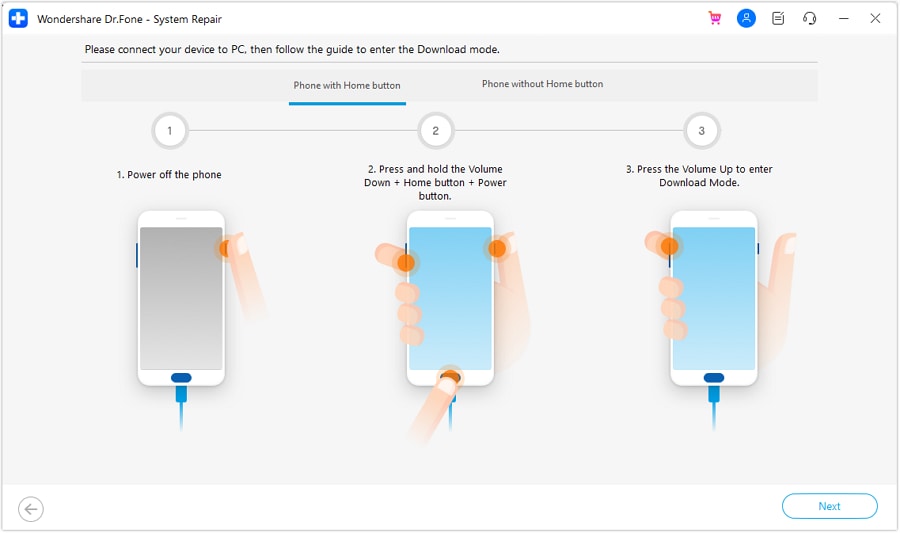
- In the absence of a ‘Home’ button: Switch off the Android device and hold the ‘Volume Down’, ‘Bixby’, and ‘Power’ buttons for 5 to 10 seconds, then release them. Hit the ‘Volume Up’ button for entering the ‘Download’ mode.
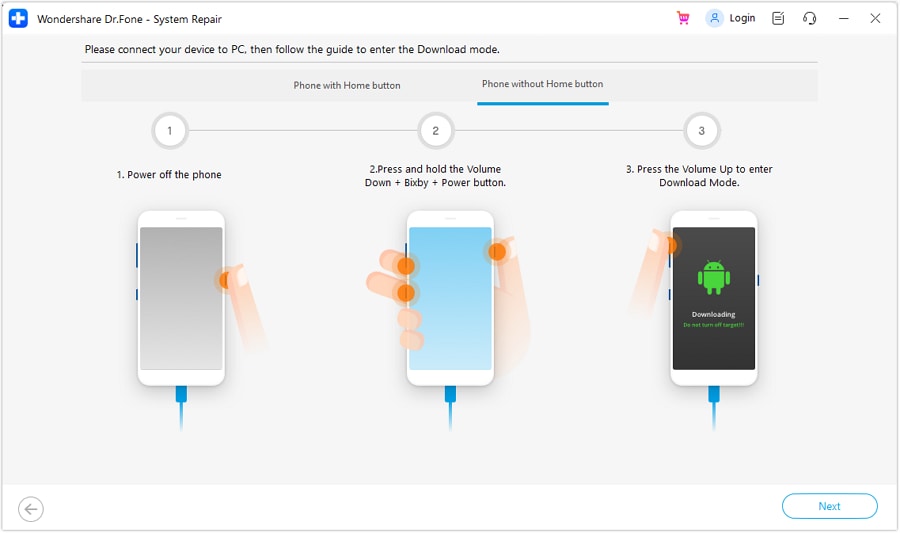
Step 2: Press the ‘Next’ button for initiating firmware download.
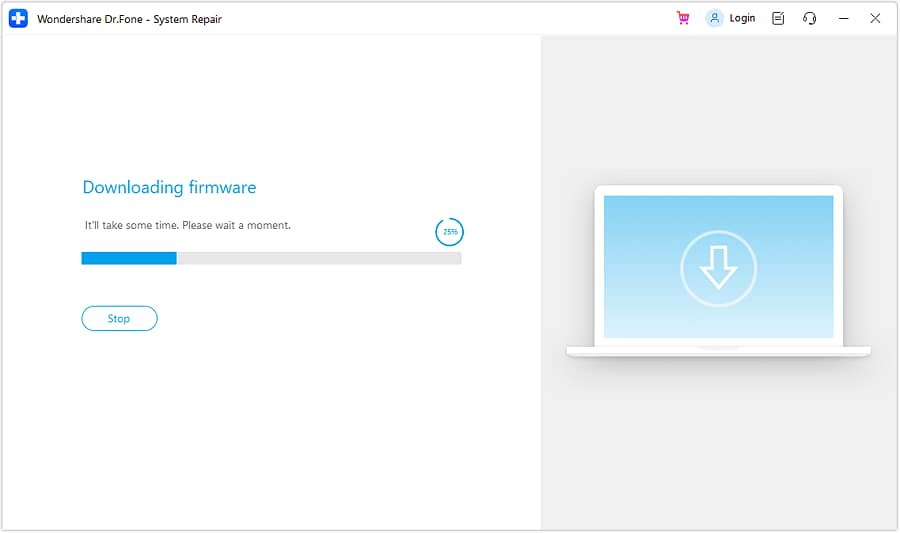
Step 3: Once the firmware gets downloaded and verified Dr.Fone - System Repair (Android) starts to flash your Dead Android phone. All the Android system issues will be fixed soon after.
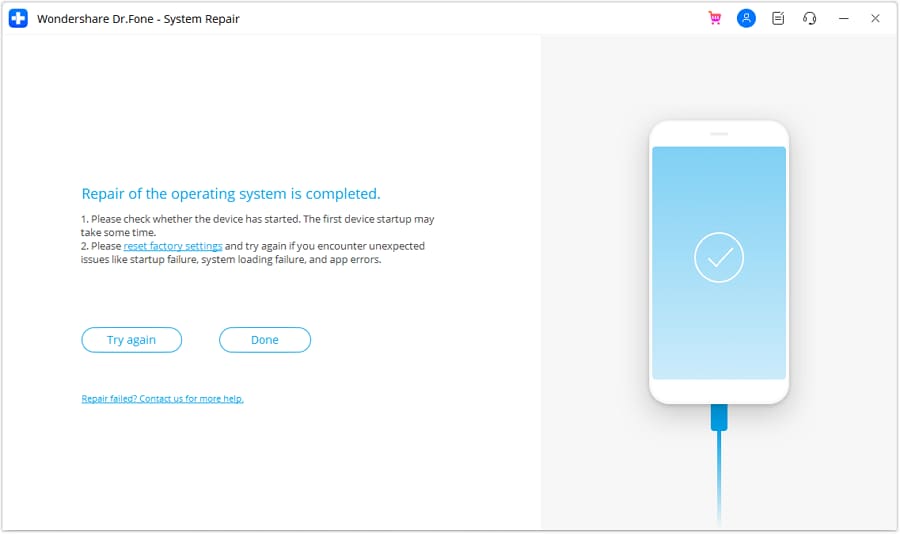

Part 3: How to flash Xiaomi Redmi Note 13 Pro 5G dead phone with Odin?
In this segment, we will learn how to fix the dead Android phone, i.e., Xiaomi Redmi Note 13 Pro 5G phones using Odin software. Odin is software used internally by Xiaomi Redmi Note 13 Pro 5G to generally unblock devices and perform a more utility-based job, namely, flashing new firmware in place of the old one. There are different variants available, so choose the one which is supported by your Galaxy phone. Here is a step-by-step explanation of how to flash dead Android phone (Xiaomi Redmi Note 13 Pro 5G) using Odin software.
Step 1: Install the driver software on the computer. You can find the best driver software for your device and PC on the official Xiaomi Redmi Note 13 Pro 5G website. You may also download Xiaomi Redmi Note 13 Pro 5G Kies on your PC. Once you have downloaded and installed the driver software, restart the PC.
Step 2: Now download suitable firmware for your device in the form of a zip folder that you can open and store on your desktop.

Make sure the file is .bin, .tar, or .tar.md5 only as these are the only file types recognized by Odin.


Step 3: In this step, download the latest version of Odin on your PC and move it to the desktop, and then right-click on the downloaded Odin file to select “Run as Administrator”.

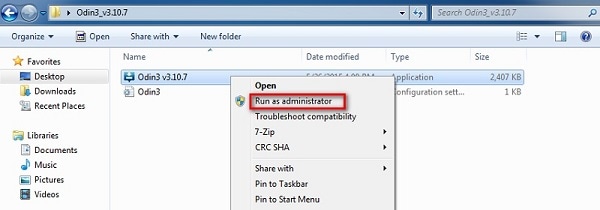
Step 4: Now, boot your dead device to Download Mode by pressing the power, volume down, and home button together. When the phone vibrates, release the power button only.

Step 5: Gently press the volume up button, and you will see the Download Mode Screen.

Step 6: Now, you may use a USB to connect your Xiaomi Redmi Note 13 Pro 5G to the PC. Odin will recognize your device, and in the Odin window, you will see a message saying “Added”.

Step 7: In this step, find the tar.md5 file you downloaded by clicking on “PDA” or “AP” on the Odin window and then click “Start”.
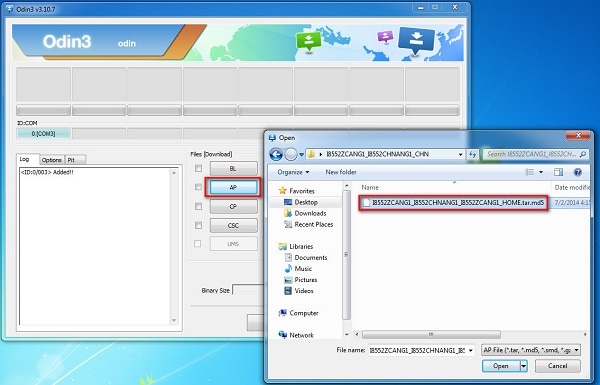
Finally, once the flashing process is complete, your Xiaomi Redmi Note 13 Pro 5G phone will reboot and start normally, and you may see a “Pass” or “Reset” message on the Odin window on the PC.
Part 4: How to flash MTK Android dead phone with SP Flash tool?
SP Flash tool, also known as SmartPhone Flash tool is a popular freeware tool used to flash custom ROM or firmware in MTK Android phones. It is a very successful tool and is extremely easy to use.
Let us look at the steps given below to learn how to flash dead Android phones using PC with the help of the SP Flash tool.
Step 1: To start with, download and install the MTK driver on your PC and then download the ROM/firmware you wish to use for flashing purposes.
Step 2: Once done, you should download the SP Flash tool and extract it on your PC and move on to launch the Flash_tool.exe file to open the SP Flash tool window.
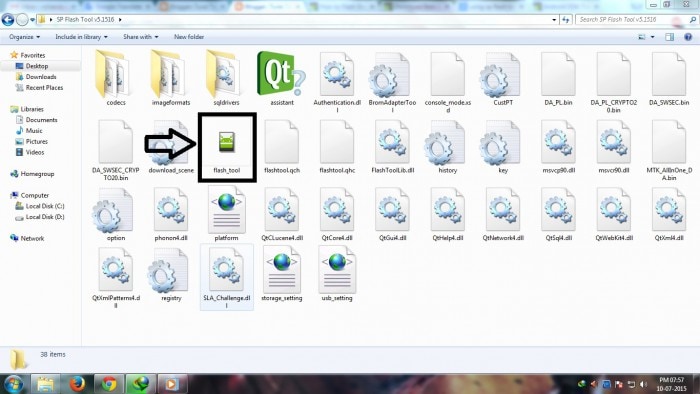
Step 3: Now, on the SP Flash tool window, click on “Download” and select “Scatter-loading”.

Step 4: The last step would be to locate the file downloaded by you and click “Open” and then finally, select “Download” on the SP Flash tool window.
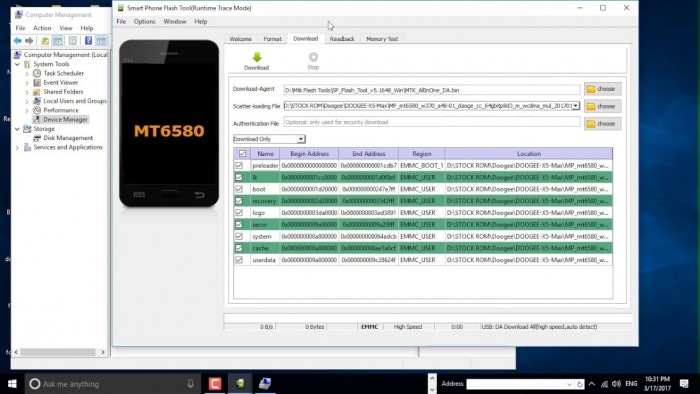
After completing the above steps, connect your dead device to the PC with a USB cable and wait for it to get recognized. The flashing process will take a few minutes to finish and then you will see a green circle indicating “OK Download”.
That’s it! Now simply disconnect your phone and wait for it to reboot.
Part 5: How to flash Xiaomi Redmi Note 13 Pro 5G dead phone with the Phoenix tool?
Phoenix tool, better known as PhoenixSuit, is a tool similar to the SP False tool and Odin. It works very well with Xiaomi Redmi Note 13 Pro 5G and is the best answer to “How to fix dead Android phone?”, “How to flash dead Android phone using PC?”, etc.
Let’s look at the steps of flashing the Xiaomi Redmi Note 13 Pro 5G dead phone with the Phoenix tool.
First, download and install the Xiaomi Redmi Note 13 Pro 5G PC Suite driver on your PC. Then you will need to download the PhoenixSuit tool and then launch it.

Now, on the toolbar, click “Tools” and select “Data Package Download” from the drop-down list.

Then move to download the firmware for your dead Xiaomi Redmi Note 13 Pro 5G and save it in a new Folder. Once done, go back to the Phoenix tool window and click on “File” and select “Open Product”.

Simply, feed in the details and then click “OK”.

After this, click on “Flashing” and select “Firmware update” and then browse to select the appropriate product code and then click “OK” again.
Then move on to select “Dead Phone USB Flashing” from the Firmware Update Box.

Lastly, just click on “Refurbish” and connect your phone to the PC using a USB cable.
That was it, the flashing process may take up to a few minutes after which your dead Xiaomi Redmi Note 13 Pro 5G will restart automatically.
Part 6: How to flash a dead phone that won’t turn on via factory reset?
Using tools for flashing Android devices can be a solution; however, it is heavily restricted to the Xiaomi Redmi Note 13 Pro 5G device models. For a generalized solution, there can be other options that you can go with. Factory resetting an Android device by putting it in Recovery Mode is one way. To know how to flash a dead Android phone using factory reset, go through the steps featured below:
Step 1: To initiate the process, you will have to put your Xiaomi Redmi Note 13 Pro 5G in Recovery Mode. Generally, Android phones are put in Recovery Mode by holding the “Power” and “Volume Up” keys for a few seconds after turning them off. The key combinations can vary according to your Xiaomi Redmi Note 13 Pro 5G.
Step 2: As the Android boot menu opens on your screen, use the “Volume Down” and “Volume Up” keys to scroll up and down the menu. On accessing the “Wipe Data/Factory Reset” option, use the “Power” key to select the particular option.
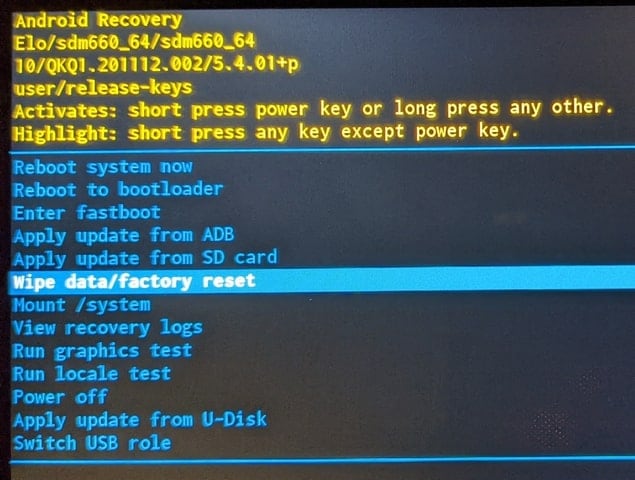
Step 3: Continue to select the “Yes” option for confirming the factory reset of the Android device. The phone will automatically reboot after successfully factory resetting.
Part 7: How to flash a dead Android phone by checking screen faulty
The screen of your Xiaomi Redmi Note 13 Pro 5G may be faulty, due to which it is not launching. While seeking the right way of how to fix a dead Android phone, you can force restart your phone using the Volume buttons according to your device model.
If the Android vibrates on restarting and the screen does not lighten up, the problem can be directed to a hardware fault. The screen is broken and needs physical assistance to resolve the issue.

Part 8: How to fix a dead Android phone by changing the battery
Another solution that can help you fix the dead Android phone is changing its battery. The battery of an Android device can last up to 3 years. When its capacity drops to a bare minimum, it is best to change the battery of your Android. Upon trying to restart your Xiaomi Redmi Note 13 Pro 5G, if it does not, you might need to replace your battery. All Android phone batteries are removable, which should be regulated with proper supervision.
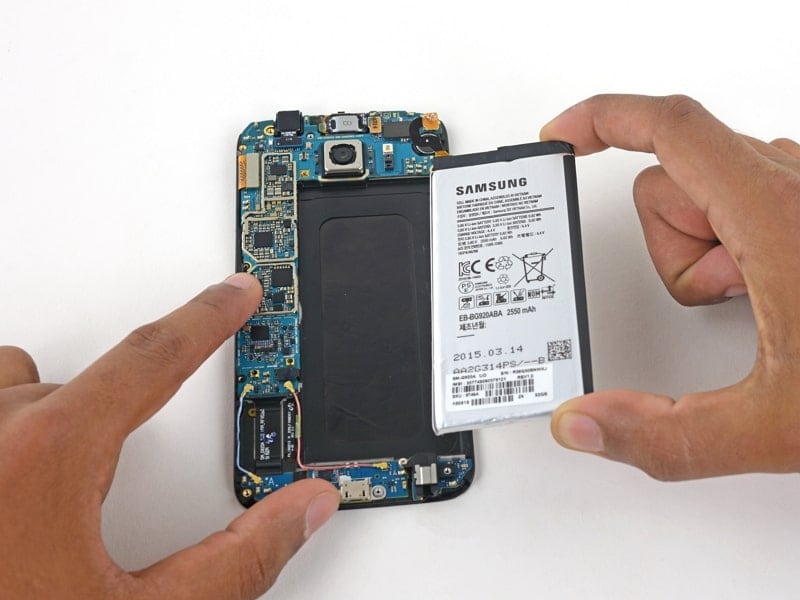
Part 9: How to repair dead Android phone by contacting official support
If you are unable to discover any proper solution for how to flash dead Android phones, you might have to consult the respective customer support of the Android phone manufacturers. Consult customer support to discover why the phone is dead and how it can be flashed. The respective personnel will assist you in resolving the issue, which might require monetary input from your side.
Conclusion
A dead Android phone might be the cause of worry, but the techniques given above to flash your dead Android device safely are very helpful. These methods have been tried and tested by users all over the world and thus, we recommend them to you. If your phone is dead or has become unresponsive, do not panic. Depending on your phone’s brand, here are ways to guide you on how to fix the dead Android phone and how to flash dead Android phone using PC.
It has been observed that Wondershare Dr.Fone – System Repair (Android) assists in the best way. Resolve all your concerns involving your dead Android phone and flash it to make it operable again.
Carefully follow the instructions given, and you will be able to reboot your dead Android phone successfully.
Reliable User Guide to Fix Xiaomi Redmi Note 13 Pro 5G Running Slow and Freezing
Android smartphones have opened a lot of doors for their users. They continue to evolve year after year with the hope of giving the world a wonderful digital experience. So far, we can all agree that they’re going the extra mile and doing a really great job. Android phones today are all packed with supreme capabilities that are beneficial to everyone.
However, Android phones are still not close to perfect. They also act up sometimes and cause a stir. Some users have observed that the Android phone is running slow and freezing over time. There can be many potential reasons why Android phone runs slow suddenly. But it doesn’t mean it cannot be restored at all to its original state and function.
In this article, we will review the details of this Android phone issue. We’ll provide solutions you can try if you ever get caught in the same problem. Continue reading to learn more.
Understanding the Specs That Make Android Phones Run Fast
The issue of Android phone running slow and freezing is not limited to old devices only. The same problem has also been observed in newly purchased units. The roots of this unfortunate occurrence vary from one user to another. It depends on different elements, from external factors like users’ handling of the Xiaomi Redmi Note 13 Pro 5G device to internal factors such as its capabilities. To understand it more, below are some Android phone specifications related to the Xiaomi Redmi Note 13 Pro 5G device’s overall performance and speed.
The CPU Core Count
Unlike before, Android phones today are equipped with several cores. Each of them has the ability to execute a process alone. Therefore, the Xiaomi Redmi Note 13 Pro 5G device can handle two or more tasks at once without compromising the quality of its performance. If your Xiaomi Redmi Note 13 Pro 5G contains more CPU core, its performance surely be more powerful and speedy.
The CPU Clock Speed
Simply put, clock speed is basically the speed at which the CPU cores can carry out a cycle in a second. A faster clock speed definitely translates into the Xiaomi Redmi Note 13 Pro 5G device’s higher performance. For instance, an octa-core Android phone with a one GHz per second clock speed is a decent device. But it’s less powerful than a device with the same number of cores but runs at two GHz per second.
Random Access Memory
In a simple language, Random Access Memory (RAM) temporarily stores the data from apps that are currently running. Smartphones can be more flexible with multi-tasking if their RAM has enough space. So if you’re among these users who perform multiple tasks simultaneously, you better choose a device with more RAM.
Internal Storage
The mobile applications installed on your smartphones are directly related to internal storage. The apps save their data every time, so they behave strangely when the Xiaomi Redmi Note 13 Pro 5G device runs out of storage. If you’re using heavy mobile applications, it’s best to opt for smartphones with huge internal storage.
Reasons Why My Xiaomi Redmi Note 13 Pro 5G is Running Slow
It’s not really hard to tell why your Xiaomi Redmi Note 13 Pro 5G is slow because it’s apparently a common issue among users. But don’t worry. Most of the time, the problem is not a major concern. Here are some scenarios that may slow down your Xiaomi Redmi Note 13 Pro 5Gs.
Overloading Background Processes
It’s great to have an Android phone that can flawlessly multi-task. However, not all units can handle that well. As mentioned earlier, it depends on the CPU core count and the core’s clock speed. If your Xiaomi Redmi Note 13 Pro 5G is running slow and freezing, many processes may be happening at the same time. Your device’s cores and clock speed are potentially incapable of executing such demands.
Your Phone is Running Out of Storage
Mobile apps need to save data on your phone. They perform the tasks based on the data stored on the Xiaomi Redmi Note 13 Pro 5G device. So if your Xiaomi Redmi Note 13 Pro 5G is slow, it’s possible that your device is already running out of storage. Each app has its own storage requirement. If your phone goes below that, the app will surely crash and not work.
Animation Speed is Way Too Slow
You can modify the Xiaomi Redmi Note 13 Pro 5G device’s animation type and speed on your Xiaomi Redmi Note 13 Pro 5G via the developer’s option. However, altering its default settings can sometimes make the Android phone run slow. If the speed is set slower, more delays are added to the animation. Hence, it takes a while for Your Xiaomi Redmi Note 13 Pro 5G to launch an app or complete a certain process.
You’re Using an Outdated Android Version
If your Xiaomi Redmi Note 13 Pro 5G is running slow and freezing, the Xiaomi Redmi Note 13 Pro 5G device’s software is probably outdated. The mobile apps installed on your device are lagging or crashing because they’re no longer compatible with the OS. It happens most of the time. Hence, always watch out for OS updates.
Your Phone is Experiencing Some System Issues
Operating systems and device software serve as the main component of all smartphones. Sometimes, it runs into inevitable problems caused by computer bugs and other glitches. When it happens, the Xiaomi Redmi Note 13 Pro 5G device’s overall performance is affected. So that can be the reason why sometimes your Xiaomi Redmi Note 13 Pro 5G is running slow and freezing.
Your Internet Connection is Unstable
Of course, a slow internet connection can make the Android phone runs slow too. Most apps today rely heavily on the internet to execute some tasks like communicating and streaming. So don’t panic when your Xiaomi Redmi Note 13 Pro 5G is running slow and freezing. It’s possible that your internet connection is messing up with you.
What to Do When My Xiaomi Redmi Note 13 Pro 5G Lags?
It’s not as bad as the black screen of death when the Android phone runs slow. However, it can still cause some delays and inconvenience for users. So it’s really important to take action when you notice some anomalies with its speed and performance. Below are some remedies that can help you get rid of this issue.
Solution 1: Reboot Your Phone
Sometimes, minor bugs can give your device a hard time. It can be the reason why your Xiaomi Redmi Note 13 Pro 5G is running slow and freezing. If that’s the case, rebooting your phone might help a lot. Here’s how to do it.
- Step 1: For seven seconds or more, hold the Power and the Volume Down button together.
- Step 2: Several options will manifest on the screen. From there, click Restart. Wait until your device completely shuts off and restarts again.
Solution 2: Uninstall the Unused Apps to Free Up Some Storage
If your Xiaomi Redmi Note 13 Pro 5G is running slow and freezing, it’s likely because you’re running out of internal storage. You may uninstall the apps you rarely use to free up some space. Here’s how to do it.
- Step 1: On your home screen, find the app you wish to uninstall. Hold its icon until an option list appears.
- Step 2: Click Uninstall.
- Step 3: Click Ok if it asks you to confirm the action.
Wait until the app icon disappears from the home screen.
Solution 3: Set the Animation Speed a Little Faster
Altering the animation speed is not that dangerous. However, it can sometimes interfere with the Xiaomi Redmi Note 13 Pro 5G device’s smoothness if set too slow. If your Xiaomi Redmi Note 13 Pro 5G is running slow and freezing after modifying this setting, try to re-adjust it a little faster. Here’s how to do it.
Initiate the following steps first to enable the developers option on your device. Skip this if you have already activated the developers option:
- Step 1: Go to Settings.
- Step 2: Find the About Phone option. Click on it.
- Step 3: Find the Build Number. And then click on it seven times.
- Step 4: Enter your lock screen passcode if necessary.
Follow these steps to adjust the animation speed:
- Step 1: Tap Settings from your home screen.
- Step 2: From the given options, find and click Systems.
- Step 3: Click Developers options.
- Step 4: Under the Drawing section, you’ll find the following animation scale settings: Window Animation Scale, Transition Animation Scale, and Animator Duration Scale. Adjust the speed of these three options to 0.5x.
Solution 4: Update Your Phone to the Latest Android Version
It’s always recommended to update your phone to the latest Android version. Aside from repairs to some system errors, it also keeps your phone compatible with mobile apps. An outdated operating system can be the reason why your Xiaomi Redmi Note 13 Pro 5G runs slow, and the apps are freezing. Don’t worry. It’s very easy to perform. Here’s how to do it.
- Step 1: First, ensure your internet connection is strong and stable to avoid unwanted interruptions.
- Step 2: Go to Settings.
- Step 3: Click About Phone.
- Step 4: Click Check Now for Update. If there’s new software available, it will automatically appear on the screen.
- Step 5: Click Install Now. Depending on your device, it will restart itself after the installation process.
Solution 5: Reset Your Xiaomi Redmi Note 13 Pro 5G to Factory Settings
One way to restore the original performance of your Xiaomi Redmi Note 13 Pro 5G is to revert it back to factory settings. It deletes all the phone’s data and adjusts the settings to default. Most of the time, this procedure works magic. It fixes numerous issues, including the Android phone that’s slow and constantly freezing. But ensure your phone has already been backed up before commencing this step. You may use Wondershare Dr.Fone to help you back up and secure your files.
Here’s how to back up your Xiaomi Redmi Note 13 Pro 5G using Wondershare Dr.Fone:
- Step 1: Download Wondershare Dr.Fone from its official website. And then install it on your desktop.
- Step 2: Launch the application on your computer.
- Step 3: After it fully loads, connect your Xiaomi Redmi Note 13 Pro 5G to your computer.
- Step 4: From the main dashboard, find and click Phone Backup. Ensure your device is in USB Debugging mode.
Step 5: Check the files or data you wish to back up. Right after, click Backup.
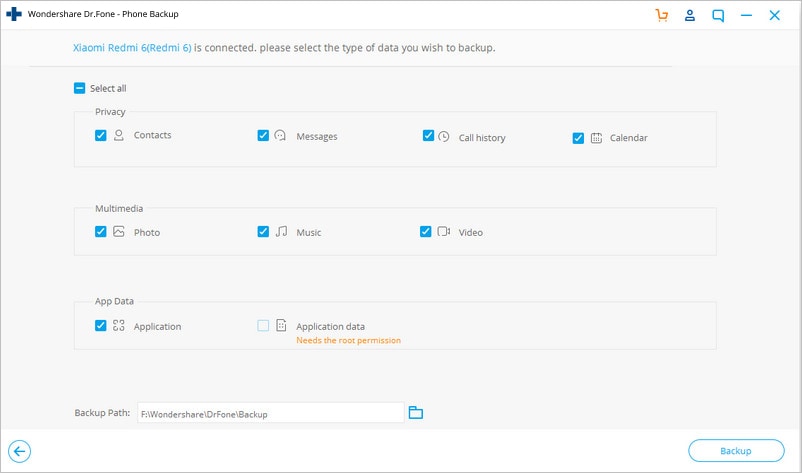
Here’s how to reset your Xiaomi Redmi Note 13 Pro 5G to factory settings:
- Step 1: Go to Settings.
- Step 2: Click System.
- Step 3: Click Reset Options.
- Step 4: Click Erase All Data (Factory Reset).
- Step 5: Your Android phone will inform you about the data that will be deleted from this procedure. From there, click Reset Phone.
- Step 6: Your Android device will ask you to confirm the procedure. From there, click Erase Everything.
Solution 6: Fix the System Issue Using Wondershare Dr.Fone
The device’s operating system may sometimes run into unexpected problems. That can make your Xiaomi Redmi Note 13 Pro 5G performs slow. System issue is not a terrifying scenario at all. Thanks to Wondershare Dr.Fone, which provides instant repair to this kind of mobile problem. Here’s how to use it in easy steps.
- Step 1: Launch the Wondershare Dr.Fone application on your desktop. And then connect your Xiaomi Redmi Note 13 Pro 5G to your computer.
- Step 2: Click System Repair from the main dashboard or Toolbox section.

- Step 3: Click Android.
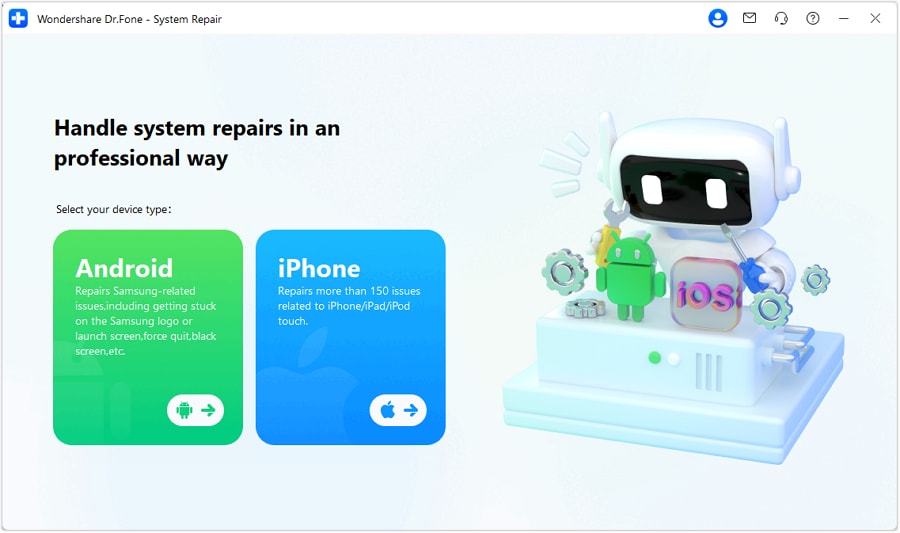
- Step 4: Wondershare Dr.Fone will give you a list of the Android problems that this procedure will fix. From there, click Start.

- Step 5: Wondershare Dr.Fone will ask you to confirm your device details. Review the listed details for Brand, Name, Model, Country, and Carrier. Amend them if necessary. Tick the checkbox beside the Note if you agree to the terms. Lastly, click Next to proceed.

- Step 6: At this point, you need to put your device into Download Mode. Power off your device. And then hold these three buttons altogether: Volume Down, Home (or Bixby if you’re using a newer model), and Power buttons. Finally, press the Volume Up button.

- Step 7: Wondershare Dr.Fone will automatically download the firmware that matches your device’s specifications. Wait until the process has been completed.

- Step 8: Thereafter, the details about the newly downloaded firmware package will be displayed on the screen. From there, click Fix Now.
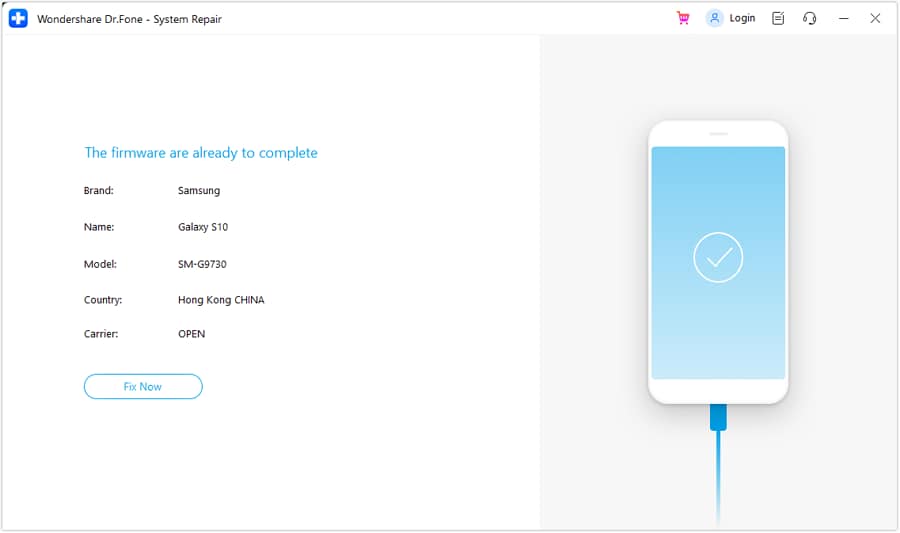
- Step 9: Before initiating the installation process, Wondershare Dr.Fone will ask you to review and confirm the firmware details. It will also let you know that this procedure will erase the phone’s data. If you agree to the terms, enter 000000 into the input box and click Confirm.
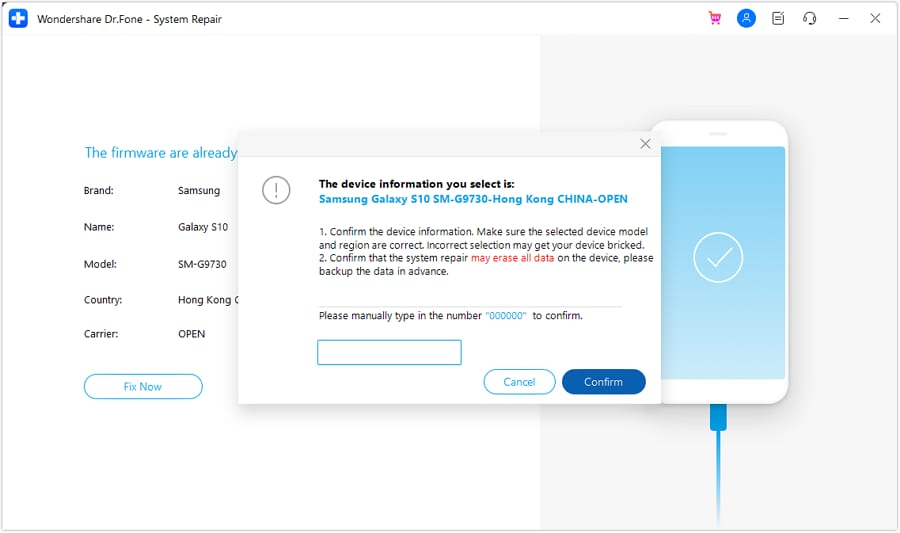
- Step 10: Wait while Wondershare Dr.Fone installs the new firmware to your device.
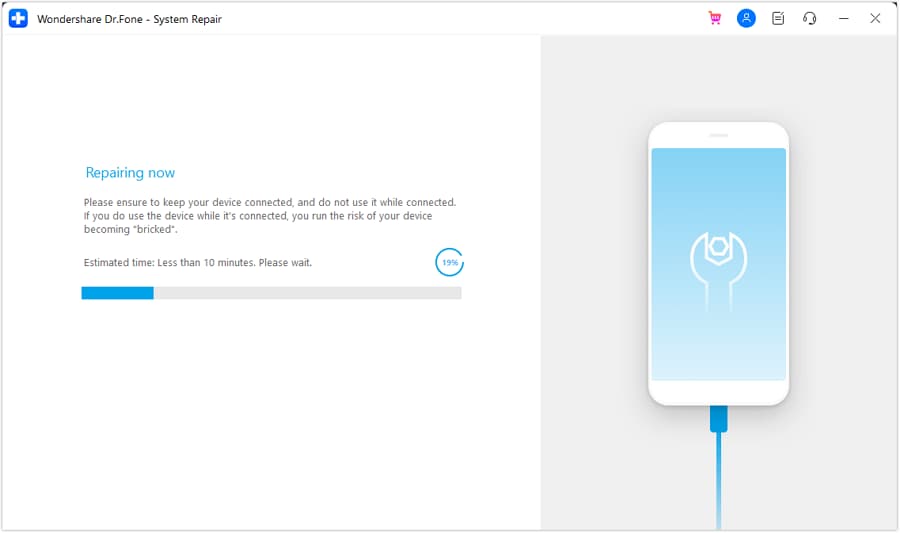
- Step 11: A notification will immediately appear after installing the new firmware. Click Done if your phone starts normally. Otherwise, click Try Again to repeat the process.

3,660,347 people have downloaded it
Conclusion
Android phone is capable of performing lots of stuff. It can assist you in both your personal and professional tasks. But if it’s sluggish and doesn’t execute optimally, the good things it promises all go down the drain. So if you notice that your Xiaomi Redmi Note 13 Pro 5G is running slow and freezing, act fast to resolve the issue. Wondershare Dr.Fone can be of great help in this kind of situation. It’s an all-in-one mobile solution that can assist you with system repair, phone backup, data recovery, and a lot more.
Full Guide: How To Fix Connection Is Not Private on Xiaomi Redmi Note 13 Pro 5G
Are you encountering the “your connection is not private” issue on your phone? We found many Android users have increasingly expressed their frustrations with this recurring problem while browsing on the internet.
Usually, you can just reload the page to fix the error. But in case it doesn’t help, you may need to look for more advanced solutions. In the following discussion, we will delve into why this “your connection is not private” on Android happens and explore solutions that work for you.
Part 1: Addressing Your Connection Is Not Private on Android
First of all, what does “your connection is not private” on Android mean? To answer this question, it’s essential to understand that this error is often associated with Secure Socket Layer (SSL) protocol issues.
SSL is a cryptographic protocol created to establish a secure communication channel over the internet. Its primary purpose is to ensure the confidentiality and integrity of data exchanged between a user’s device and a website’s server.
The error message appears when there’s a problem with the SSL/TLS (Transport Layer Security) certificate of the website you are trying to access. This certificate is a digital document that authenticates the website and encrypts the data transmitted between the user’s device and the server.
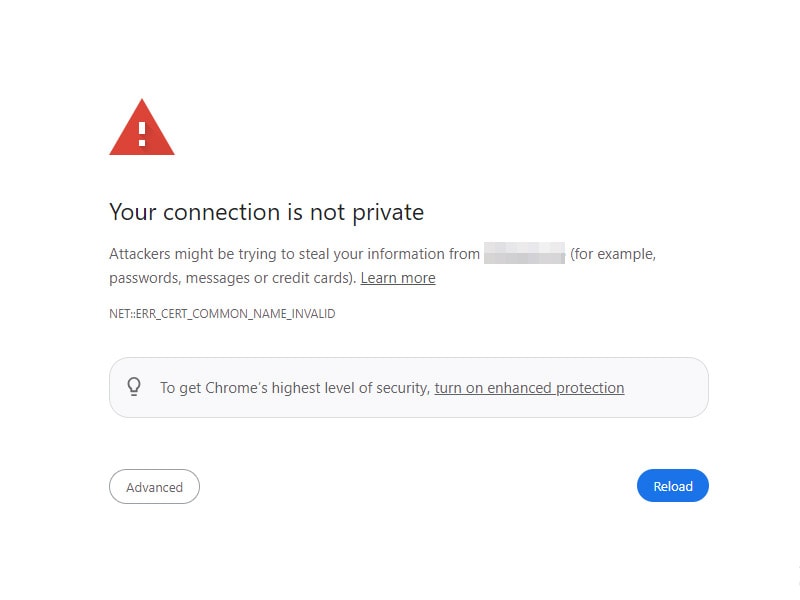
Some common factors that could trigger the “your connection is not private” on Chrome Android error:
- Expired or invalid SSL certificate of the website;
Certificates are issued for a specific period, and if the website owner fails to renew it in time, your browser will detect it as not secure.
- There is a mismatch between the domain on the certificate and the actual domain you are trying to visit;
This discrepancy might occur due to a misconfiguration on the website or, in some cases, due to a man-in-the-middle attack where a third party intercepts the communication between your device and the server.
- No HTTPS enforcement;
Another reason for the issue is if the installed SSL certificate doesn’t turn on the “force HTTPS” option. This means visitors might be using the non-secure HTTP version of the site instead of the safe URL.
So, the error serves as a warning to users, indicating that the connection may not be secure and sensitive information could be at risk.
Browsers, including those on Android devices, prioritize user safety and privacy. They will block access to potentially compromised websites to prevent data theft or unauthorized access. That’s why when you get the “your connection is not private” message on Android, you can’t access the website.
Part 2: What The Error Codes in “Your Connection Is Not Private” Mean
When “your connection is not private” on Chrome Android error shows up, it often comes along with specific error codes that can indicate the root cause of the issue. Understanding these error codes is crucial for troubleshooting and resolving the problem effectively.
- ERR_CERT_SYMANTEC_LEGACY: Unsupported Symantec-issued certificate
This error code indicates that the website you are attempting to access is equipped with an unsupported Symantec-issued certificate. Symantec, a prominent Certificate Authority, had faced concerns about the security of its certificate issuance processes.
As a result, major browsers, including Google Chrome, no longer support certificates issued by Symantec. If you encounter this error, it implies that the website’s SSL certificate is outdated and needs to be updated with a certificate from a trusted Certificate Authority.
- NET::ERR_CERT_AUTHORITY_INVALID: Unauthenticated SSL certificate
The presence of this error code suggests that the SSL certificate of the website cannot be authenticated by your browser. This could occur if the certificate is self-signed or issued by an unrecognized Certificate Authority.
- NET::ERR_CERT_DATE_INVALID: Date and time mismatch
This error code points to a discrepancy between your Xiaomi Redmi Note 13 Pro 5G’s date and time settings and the information on the website’s SSL certificate, as they have expiration dates. If the date and time settings on your device are incorrect, it may prevent the certificate from being validated. Correcting your device’s date and time settings should resolve this issue.
- SSL certificate error: Generic or unspecified problem
This is a more generic error message that indicates a problem with the website’s SSL certificate without specifying the exact nature of the issue. It could indicate various issues, such as an expired certificate, a misconfiguration in the certificate chain, or other SSL-related problems.
Part 3: How To Fix Your Connection Is Not Private on Android
Encountering the “your connection is not private” error on Android can be a frustrating experience. Fortunately, there are various methods to address and fix this issue, depending on its underlying cause.
In this section, we will explore some effective solutions to help you regain a secure and private connection.
Method 1: Clear your cache
When you use the internet, web browsers store information about your online activities in cached data and cookies to speed things up. However, having too much of this data can cause problems instead. It might even stop your browser from connecting securely.
So, clearing your browser cache and data can be a quick and simple “your connection is not private” Android fix. Follow the steps here:
- Step 1: Open and launch Chrome.
- Step 2: Access the Menu (the three dots button) to open the Settings. Select Privacy and Security > Clear Browsing Data.
- Step 3: Opt for the “All Time” option and click “Clear Data” to erase your cache.

After successfully clearing your browser cache and data, revisit the website to check if the problem persists.
Method 2: Repair the Android system
Addressing the “your connection is not private” to fix on Android involves examining both the Xiaomi Redmi Note 13 Pro 5G device and the website. If clearing browser data doesn’t help, there might be an issue with your Android system. One solution is to use the Wondershare Dr.Fone system repair tool to fix the issues safely.
How to perform system repair with Dr.Fone:
- Step 1. Open the Repair Tool
Start by launching Wondershare Dr.Fone on your computer. Go to the Toolbox section and connect your Xiaomi Redmi Note 13 Pro 5G. Choose System Repair and pick Android as your device type.


4,322,863 people have downloaded it
- Step 2. Begin Repair
Click Start on the new screen to kick off the repair. Since you’re dealing with a connection private issue on Android, select System Damage.

- Step 3. Fill in the Xiaomi Redmi Note 13 Pro 5G device Details
The platform will detect your Xiaomi Redmi Note 13 Pro 5G’s brand. Confirm the Name, Model, Country, and Carrier. If your device is unlocked, choose OPEN in the Carrier section. Agree to the warning, click Next, and proceed with the repair.

- Step 4. Activate Download Mode
Follow the instructions to put your Xiaomi Redmi Note 13 Pro 5G into Download Mode. Once in Download Mode, you will start downloading the firmware.

- Step 5. Confirm Installation
Remember, the repair may erase data. It’s advisable to back up your data first before starting the repair. Enter “000000” to confirm the repair process, shown by a progress bar.

When done, click Done if your Android starts properly. If not, click Try Again to repeat the process.
Method 3: Check and fix the date and time on your Android
Since the error code “NET::ERR_CERT_DATE_INVALID” indicates a mismatch between the date and time on your device and your browser, you need to adjust the date and time settings on your Android to fix it.
The specific steps can vary based on your Android model, but the general approach involves locating the “date and time” settings on your phone. How to fix the date and time on Android to bypass “your connection is not private” on Chrome Android:
- Step 1: Go to your Xiaomi Redmi Note 13 Pro 5G’s Settings > Date & Time.
- Step 2: Switch on the “Automatic Date & Time” to sync with the network-provided time.

Method 4: Perform factory reset
If nothing else works, there might be malware on your phone causing trouble. It’s crucial to eliminate this threat before further damage occurs. The recommended action is to perform a factory reset on your phone.
However, keep in mind that this process can result in data loss, so it’s essential to back up your data beforehand. Follow the steps to perform a factory reset on Android:
- Step 1: Go to your Android Settings.
- Step 2: Select Backup and Reset > Factory data reset. Then, opt to erase all data.

Most of the time, you won’t need to go to the extreme of a factory reset. The simpler solutions mentioned earlier should take care of the Security Certificate Error on your Android.
Conclusion
By now, you should have a good grasp of the “Your Connection Is Not Private” problem on Android. This issue typically arises from complications with the SSL certificate of the website, designed to ensure a secure connection.
When you see the error message, it often comes with specific codes that indicate the underlying problem. Several methods can be employed to fix the “Your Connection Is Not Private” on Android. Clearing the browser cache, repairing the Android system using tools like Dr.Fone, checking and fixing date and time settings, and performing a factory reset as a last resort are among the solutions.
By prioritizing user safety and following the step-by-step approach in this guide, you can navigate and resolve this common internet browsing challenge on your Xiaomi Redmi Note 13 Pro 5Gs.
Also read:
- [New] 2024 Approved Influencing Earnings Through Channel Partnerships
- [Updated] The Intersection of Design & Efficiency in Professional Environments for 2024
- A Comprehensive Guide to Each Cast and Crews Purpose on Set
- Discover Advanced Karaoke Control with PCDJ's New Feature in DEX Software (Version 3.11.0.1)
- Fixing the COD: WW2 Error 4220 Issue for Smoother Gaming Experience
- How To Fix Part of the Touch Screen Not Working on Sony Xperia 1 V | Dr.fone
- How to Fix the Soft Bricked Realme 11 5G? | Dr.fone
- How To Revive Your Bricked Tecno Spark 10C in Minutes | Dr.fone
- New How To Get More NFL Viewers For Your Sports Live Streaming Channel for 2024
- Reasons for Nokia C22 Stuck on Startup Screen and Ways To Fix Them | Dr.fone
- Restore Missing App Icon on Realme 12 Pro 5G Step-by-Step Solutions | Dr.fone
- Title: How to Flash Dead Xiaomi Redmi Note 13 Pro 5G Safely | Dr.fone
- Author: Abel
- Created at : 2025-01-04 18:41:19
- Updated at : 2025-01-10 18:13:28
- Link: https://fix-guide.techidaily.com/how-to-flash-dead-xiaomi-redmi-note-13-pro-5g-safely-drfone-by-drfone-fix-android-problems-fix-android-problems/
- License: This work is licensed under CC BY-NC-SA 4.0.
